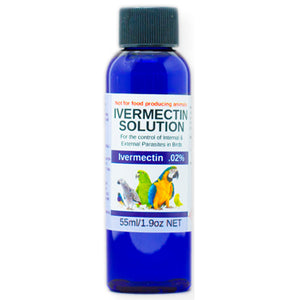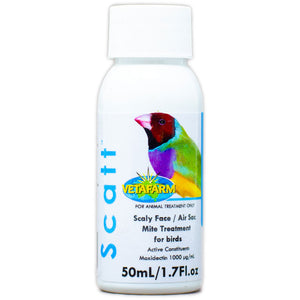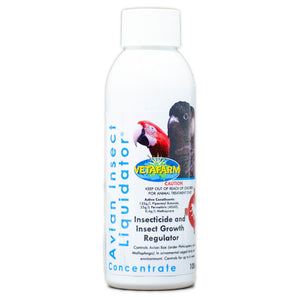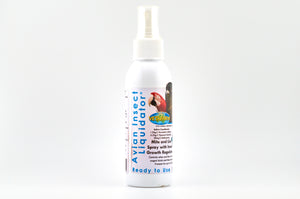Feather Plucking and Ways to Solve it
Health Articles / Feather Pluck
Nutrition alone can have a major impact on feather mutilation in very many cases. If your bird is otherwise healthy try this before visiting the vet.
The more we deal with feather plucking, feather picking and other forms of self-mutilation the more we find that many cases have nutritional backgrounds and nutritional solutions.
However there are a number of medical conditions that will cause birds to pluck. These start with parasites but also include diseases such as liver damage. Where stress, environmental and behavioural issues are involved these must be identified and corrected. Has you bird been recently stressed by a change in routine or location? Is it getting enough sleep? Has it been ill?
The problem with stress and environmentally induced plucking is that the behaviour often continues despite the removal of the source of stress. Diet can often be a key factor in treating this chronic problem. The first dietary issue is calcium. Because calcium is involved in nerve and brain function a shortage of calcium can lead to many nervous disorders including plucking. Often it is the key "missing" ingredient. CalciBoost is now always a part of our recommendation for feather pluckers as it has a calming effect.
Feather plucking birds are always stressed. Because of this their digestive systems are rarely working well. Potent Brew calms the bird down by maximising gut function and improving nutrient absorption.
Finally we try to sped up the growth of replacement feathers to minimise any irritation caused by the emergence of the new feather. We do this with Feather-Up (or Daily Essentials3) which is a very comprehensive vitamin, mineral, limiting amino acid and balanced protein supplement.
Feather Up is designed to add to foods like egg foods or fruits and vegetables though for some fussy feeders it may be able to be fed with toast or some other treat. If the plucking bird is only eating seed then we must supplement through the drinking water. As this product will not dissolve we have designed Fussy Feeder Essentials
So Feather-Up (or Daily Essentials3), CalciBoost and Potent Brew are our regular recommendation for feather plucking birds. If nutrition alone fails to fix the problem there may be a role for herbal or homeopathic remedies. If this route, or drug therapies, are selected you must maintain the nutritional support.
Feather picking, chewing, plucking and other forms of self mutilation
Feather picking (and other similar forms of self mutilation) are major problems. Although most have nutritional problems as their origin there are some medical conditions that can be implicated so veterinary testing may be required. The most common cause of self mutilation appears to be calcium deficiency. As research tells us that 98% of pet birds are getting less than the recommended levels of calcium in their diet it is actually surprising that there aren't more cases of this distressing condition.
Calcium is involved in both nerve and muscle function. Calcium deficient animals often show nervous behaviour such as fear, aggression and self mutilation. So the central part of our recommendation is to add CalciBoost to the diet. The important thing about CalciBoost is that the calcium it contains is very easily absorbed from the gut into the bloodstream. In actual fact the amount of calcium it supplies is quite low but its bio-availability makes up for that.
Our normal recommendation for CalciBoost is to supply it five days a week for the first month and reduce that to twice a week after that. The reason for the high early dose is that calcium deficient birds have low reserves in their bones. Early supplies get sucked up by the bones so the nerves can still be denied adequate quantities. It is the movement of calcium in and out of blood, nerves, muscles and bones that leads to the variable severity of calcium related symptoms.
Birds showing severe calcium related symptoms such as fits and seizures we would often recommend get three 'daily doses' directly into the beak two hours apart. Birds this distressed are normally easy to handle.
Normal dose rates for CalciBoost are as follows:
Parakeets 2 drops
Cockatiels 4 drops
African Greys 15 drops
Cockatoos 10-20 drops
Large macaws 30 drops
The rule of thumb is 1 ml (30 drops) per kilogram of body weight.
The important thing about these quantities is that they are the amounts to be consumed so allowance must be made for food wastage. Most parrot owners put their CalciBoost onto fresh foods or human foods such as toast. Frankly it doesn't much matter what the carrier is so long as the bird consumes it. We only recommend adding CalciBoost to drinking water for birds that are not eating moist fresh foods. Eaters of moist foods do not drink much water. When added to water the application rate is 20 mls per litre, 12 mls per pint or one 5ml teaspoon per half pint. The second product we use for feather plucking is Feather-Up (Daily Essentials3 will normally work just as well). Birds that are on calcium deficient diets are very likely to be deficient in many other important vitamins and minerals. The requirement to grow new feathers also puts great demands on the sulfur containing amino acids (70% of the birds sulfur containing amino acids are in the feathers). These nutrients are in short supply in all plant foods so supplementation has an enormous effect on the bird's ability to grow new feathers (so this applies to normally moulting birds too).
The recommended daily levels of Feather-Up (or Daily Essentials3) are:
Parakeets a small pinch
Cockatiels a small pinch
African Greys 2 pinches
Cockatoos 2-4 pinches
Large macaws 4-5 pinches
Again these are the quantities to be consumed so allowance for wastage should be made.
Both the CalciBoost and Daily Essentials3 should be a routine supplementation for the whole of a bird's life. The third product (Potent Brew) in our system for pluckers is only likely to be used for a month or two.
Self mutilating birds may be plucking because they are stressed or they may be stressed because they are plucking. Either way they are stressed! The stress response reduces the blood supply to the digestive system as part of the normal 'fight or flight response'. Prolonged stress causes chronic digestive upset leading to many complications. Our experience is that rebalancing the digestive system can have a significant positive impact on plucking birds as it maximises absorption of the important nutrients we are supplying in the other supplements. We do this with our unique liquid (planktonic) probiotic Potent Brew.
Normal dose rates for Potent Brew are as follows:
Parakeets 2 drops
Cockatiels 4 drops
African Greys 15 drops
Cockatoos 10-20 drops
Large macaws 30 drops
The rule of thumb is 1 ml (30 drops) per kilogram of body weight. Potent Brew is given daily so a typical African Grey gets two months' supply from a 30ml bottle.
| Recommended | Pellet content | 100% | 50% | 25% | ||||||
| daily allowance | per kg | of diet | of diet | of diet | ||||||
| Vitamin D3 | 1,000 ius per kg | 1,075 ius per kg | 108% | 54% | 27% | |||||
| Calcium | 0.5% | 0.6% | 120% | 60% | 30% |
The Problem With Pellets
About half of the American feather plucking birds we are asked to help are getting a pellet as part of their diet. This causes enormous problems. Many vets and owners assume that birds on pellets are being well fed. Yet the vast majority of such birds are only getting pellets as a small proportion of the diet. The pellet manufacturers 'over supplement' some of the vitamins to allow for this a little but they don't add enough to compensate for normal levels of poor compliance. So pellets give owners and vets a false sense of security. Let me quantify this by using Harrison's Adult Lifetime Formula as an example in this table.
Our experience is that most pet birds that are getting pellets only get 10-25% of the diet in that form. The balance is seeds, nuts, fresh foods and human foods. The levels of calcium in the diet provided by the underused pellet is simply not enough. The RDA for calcium assumes the mineral is provided by 'traditional' supplements such as calcium carbonate and dicalcium phosphate. These are very difficult for the body to absorb. CalciBoost provides less calcium but gets more into the bloodstream.
The Problem With Vets
Our experience is that many vets simply don't understand the calcium issues involved in feather plucking or other behavioural or coordination related symptoms). Fortunately many are now coming around to our way of thinking. One of the common blood tests vets perform is the test for calcium levels. For many years we have noted that birds with 'normal' blood calcium levels respond very well to supplementation with CalciBoost. So we basically ignored these test results.
Modern veterinary work is now explaining why we have been correct all these years. Vets traditionally test for 'total blood calcium'. This figure goes up and down with 'total blood protein'. Sick and stressed birds often have high protein levels in the blood hence high calcium levels. But the profession is now telling us that the correct measure of blood calcium is the 'ionic calcium' level. This does not go up and down with protein levels and more clearly reflects the calcium available for use in nerves and muscles. Of course many vets have not yet caught up with the new testing methodology.
So our normal process is to understand the bird's dietary history (checking actual quantities consumed very carefully) and in most cases recommending the supplements described above. Only if we have a reason to believe that diet is not the issue (from the questions we have asked) do we send people to their avian vet for tests for zinc poisoning, giardia etc. If our recommendation does not work we will also recommend a vet visit.
Behaviour, Hormones And Other Explanations
Most of the pluckers we are asked to help have cages stuffed with toys because someone has blamed the behaviour on boredom. There is no doubt that pet parrots need our attention but it is rare to find more toys helping. Many owners unconsciously reward their birds for plucking by scolding them. This is counter-productive. If your bird wants your attention he/she will pluck again.
Hormonal changes may initiate plucking behaviour but wild birds don't pluck when they reach puberty. So it is far more likely that the hormones are simply stressing an already calcium deficient bird beyond its limits. Plucking may be the results.
Other changes often initiate plucking - owners going on holiday, change of environment, new birds in the collection. Often removal of the stressor does not stop the plucking behaviour. These are the circumstances in which our system seems to work most reliably. Nobody has a guaranteed solution to the plucking problem but we are confident that our three products, used correctly, have a very high success rate. If they don't work please contact our free advice services and we will recommend changes or a vet to visit.
Finally, if one bird in a collection is feather picking because of nutritional problems the chances are that all the birds are nutrient deficient too. Daily Essentials3 and CalciBoost are designed as year round supplements for all sorts of pet birds. Keep them happy and healthy with Birdcare Company supplements.




